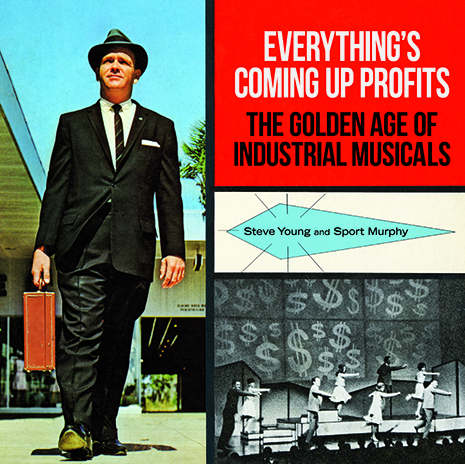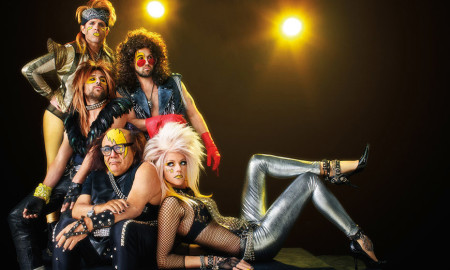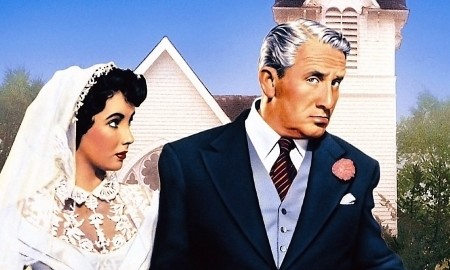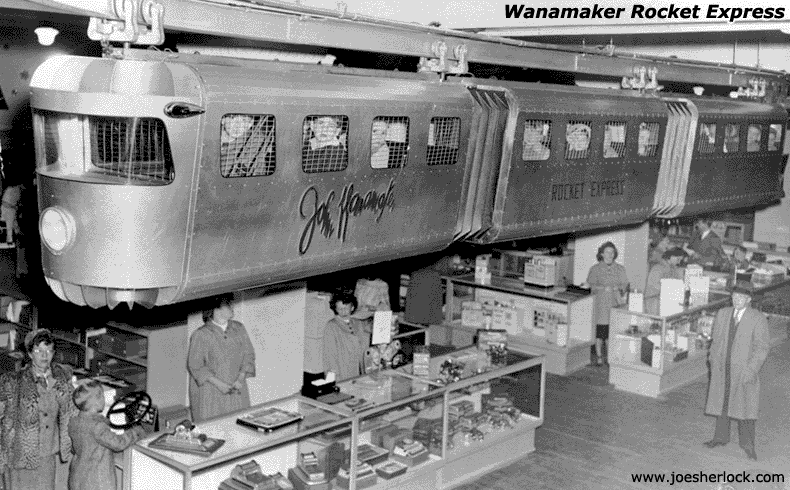

Hey, kids! Let’s put on a show about bathroom fixtures and tractors! Industrial musicals shine the spotlight on big business – musical style!
Don’t you wish – just once – that songwriters would stop writing tunes about the love you have for your lover, and start writing songs about the love you have for your bathroom?
We’re flushed with pride to tell you that this deuce has been dropped.
Thanks to The Late Show with David Letterman writer Steve Young (along with Sport Murphy), we now have front-row-center seats to one of the great forgotten phenoms of 20th century culture: industrial musicals! (display your jazz hands now).
No, don’t you dare drift off. This is a surprisingly dazzling book (in fact, diesel dazzling!) that will rouse you in unexpected ways that neither you nor I can explain. But Steve and Sport can.
Everything’s Coming Up Profits: The Golden Age of Industrial Musicals lifts the curtain on industrial musicals, as we discover how postwar corporations took boring material (retirement plans, product rollouts and quarterly quotas) and set them to music for its sales and management staffs.
Live theater revues at corporate conventions included energetic, catchy numbers on everything from life insurance to “dazzling diesels.” (1,2,3, kick! Turn!).
This was no church basement production. The performances and performers were deadly serious and strictly professional. Broadway-trained actors/singers/dancers and highly paid composers and directors toiled till deadline to sing the praises of a new car line or the next wonder fabric.
One awesome alum: Sheldon Harnick, who went on to write the lyrics to the Broadway classic, Fiddler on the Roof.
You may only see a plunger. These people saw a show-stopper.
In its day, when Broadway musicals were more deeply rooted in contemporary popular music, these songs could draw actual tears from employees, not eye rolling. Standing ovations too.
The result: a reinvigorated, re-energized staff, ready to hit the road.
The long forgotten cast recordings of these productions were, at last, unearthed in dusty thrift store record bins. Now, the curtain lifts.
Shop Amazon – Cyber Monday Deals Week
Here, we chat with Steve about these lost gems. And make sure you click on the song link below and take a listen. You have to hear it to believe it.
One word. Are you listening? Plastics.
Steve, how in the world did this idea come about?
It grew directly out of my work for Dave [Letterman] and The Late Show. I started in 1990, and there had already been a long-running comedy piece called “Dave’s Record Collection.”
The previous writer in charge of that had left, and in the office were boxes of records. The head writer said, ‘oh, maybe you should be in charge of the record collection.’
That’s the random occurrence that led me to go to used record stores and thrift shops: anything that we could find that we could play a clip from and get a laugh from.
Did you have any prior knowledge of industrial musicals?
It was absolutely foreign to me. I had no idea that the genre existed. I just figured we could make fun of it on the show, but I found myself still humming these songs to myself about selling diesel engines and typewriters and insurance plans.
I thought, why is this stuff so good and sticking in my mind? These were just scraps of debris that nobody ever gathered together into a coherent whole picture before.
 What made these songs and records more compelling than Dave’s average record?
What made these songs and records more compelling than Dave’s average record?
A lot of the records we would put on “Dave’s Record Collection” were awkward or misbegotten, but there was a certain weirdness to these corporate records.
Then I got past the initial goofiness of “a whole musical about tractors!”
If you listen to the record, you see that somebody with a great deal of talent and a lot of money at their disposal was putting these things together.
They’re way better than you think they should be. They are not at all cheesy or embarrassing. Well, I take that back.
So we’re talking (and singing, and dancing) high production values and truly sincere songs and performances.
It’s a vast spectrum. All the way from the top-level stuff that was as good as anything that was ever on Broadway, all the way down to the sad little depressing outings with just a few people and one piano.
Also, the Broadway show tunes that have desperate, last-minute replacement lyrics, jamming in the company’s name. The sweat desperation comes right off the record.
The best stuff is like a revelation. The amount of talent, time and energy expended on this stuff was a huge part of the entertainment business for a long time.
Was there ever intentional humor as well as unintentional?
There was humor in some of these productions. Sometimes there was even humor at the corporation’s expense: “Well, if we poke fun at our own foibles and let the troops know that we understand that we’re less than perfect, that will have the overall effect of a bonding experience.”
What was the ultimate goal for these productions?
The reason for spending all this money – and it was a huge amount of money – was to get people back out on the street and into the field with a renewed sense of purpose. And also new information at their fingertips, provided through the songs and the skits.
This tactic probably wouldn’t fly as well in today’s more cynical, media-savvy world.
It was a generational thing. Definitely after World War II, musicals were mainstream entertainment. People had these records in their homes: My Fair Lady, South Pacific and whatnot. It was not a great jump from that to records having a similar feel. It happened to be about the glories and tribulations of your work life.
By the ‘70s, there was an ironic, postmodern feel coming in, and you started to see shows that had rock elements, or snarky people who made it feel like a National Lampoon Radio Hour.
They tried to get in on that vibe, but [by then] the calls stopped coming. There was less of an appetite for the old-line type feel of classic musical theater.
Who were the performers?
They were toggling between these shows and “legitimate Broadway:” “I’m doing the Ford show for six weeks…sorry, I already signed up to do the Exxon show, so I can’t do the Johnson & Johnson show.”
Some of them had success on “legitimate Broadway” and did not look back. The money was great and the accommodations were very pleasant, but you had to work hard and you had to work fast and get it done.
If you were talented and had the right look and feel that companies wanted, you could do nicely for a few decades.
Was there any way to quantify the success of these musicals in actual numbers and profits?
I’ve never seen any hard data on this myself. It seems to be mostly anecdotal. For a while, it was “what everyone was doing, so I guess we should do it too.”
There was a lot of anecdotal evidence that people were leaving the convention really “ready to go.” Some people were leaving the show with tears streaming down our faces, thinking, wow, this really brought us all together.
What was your first reaction to the song, “My Bathroom?”
The improbability of it in the first wave, and then the admiration of it in the second wave. In the last week or so, I finally made contact with the woman who sang that song. She’s in real estate now but she has a lovely voice.
What is your personal favorite from this collection?
There’s a Ford Tractor show that I love from 1964 which has some quotes on the back cover from audience members. There is one that is wonderfully poignant.
It’s an unnamed Ford Tractor dealer from Austria. He was flown into New York City to go to this show at Radio City Music Hall. And he just says, “this was the most beautiful day of my life.”
At first, you burst into laughter, and then you step back for a minute, and you think what it must have been for this guy, a Ford Tractor dealer from Austria, and the company has flown him to New York, where he has seen an unbelievably elaborate, beautifully done show.
He’s being told: the work you do every day is keeping us fed. No wonder people really left this show with tears streaming down their faces.
If they were done right, they just hit you in the solar plexus.
###
Learn more about the book here
Find out more about industrial musicals here.
Listen to “My Bathroom” and other “hits” here.












